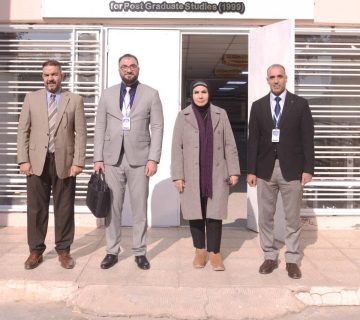The Institute of Genetic Engineering and Biotechnology for Postgraduate Studies / University of Baghdad discussed the PhD dissertation of student Ahmed Abdul-Majeed Mohammed, titled:
“Molecular Detection of Common Bacterial Contamination and Fraud in Commercially Processed Meats”,
under the supervision of Professor Dr. Amina Ne’ma Al-Thuwaini.
The study aimed to detect common bacterial contamination in processed meats sold in various Iraqi local markets—such as minced meat, burgers, sausages, luncheon meats, and canned meats—by identifying pathogenic bacteria through routine examinations. These included aerobic bacterial counts, culturing on various media, isolation of pathogens, biochemical tests, and molecular testing targeting the 16S rRNA gene and virulence factor genes for each isolate.
Another objective of the research was to determine the species of meat using both conventional and multiplex PCR (polymerase chain reaction) in order to identify the pure origin of processed meat products from eight different animals (chicken, cattle, sheep, goat, horse, donkey, pig, and dog). The study used the cyt b gene to detect fraud and assess the effectiveness of DNA-based multiplex PCR in detecting meat adulteration. It also focused on identifying non-halal meat (such as pork), donkey meat, and dog meat—species considered unacceptable for consumption.
The study demonstrated a high rate of pathogenic bacterial contamination in meat products, including Staphylococcus aureus, Salmonella, Escherichia coli O157, and Listeria, which exceeded the microbial limits of Iraqi national standards and therefore pose a serious threat to public health.
It also confirmed that most of the isolated bacteria carried virulence genes, providing evidence that these bacteria are highly harmful to human health and represent a significant threat to community well-being at various levels.
Additionally, the study found high rates of fraud or improper substitution in processed meats, especially in burgers, followed by minced meat, sausages, and luncheon meat, with lower levels found in canned meats—both intentional and unintentional adulteration.
The study recommended that molecular techniques be adopted by the Central Organization for Standardization and Quality Control and public health laboratories for the rapid and reliable detection of meat fraud.
It also recommended the enforcement of strict monitoring of meat authenticity in the food supply chain by the Ministry of Health and regulatory institutions in Iraq. This would include regular year-round testing, and for improved accuracy in detecting bacterial contamination and meat fraud, the use of multiple conserved genes and more advanced molecular techniques such as Real-Time PCR and Next-Generation Sequencing (NGS).
The study emphasized the need to evaluate the quality and suitability of consumed meats through further testing for other risk factors such as heavy metals, radiation, and toxic chemical residues, to ensure their safety for human consumption.










